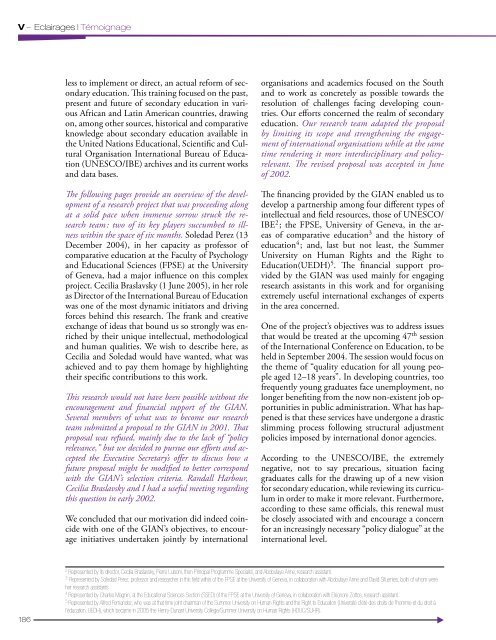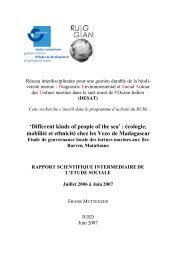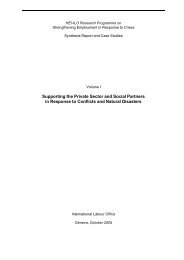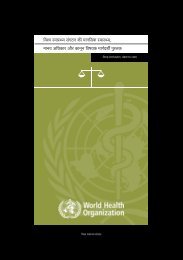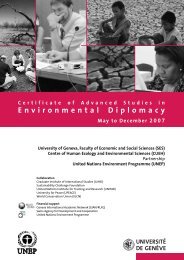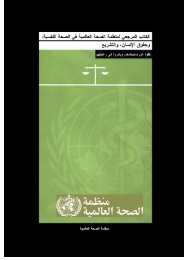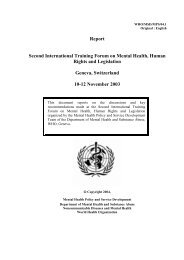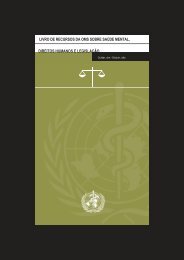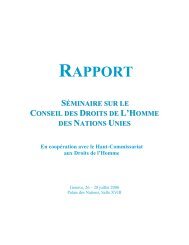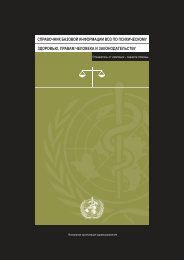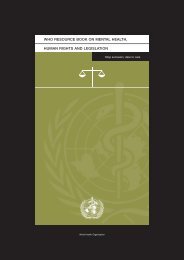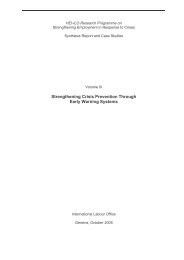Les liaisons fructueuses - RUIG-GIAN
Les liaisons fructueuses - RUIG-GIAN
Les liaisons fructueuses - RUIG-GIAN
You also want an ePaper? Increase the reach of your titles
YUMPU automatically turns print PDFs into web optimized ePapers that Google loves.
V – Eclairages | Témoignage<br />
less to implement or direct, an actual reform of secondary<br />
education. This training focused on the past,<br />
present and future of secondary education in various<br />
African and Latin American countries, drawing<br />
on, among other sources, historical and comparative<br />
knowledge about secondary education available in<br />
the United Nations Educational, Scientific and Cultural<br />
Organisation International Bureau of Education<br />
(UNESCO/IBE) archives and its current works<br />
and data bases.<br />
The following pages provide an overview of the development<br />
of a research project that was proceeding along<br />
at a solid pace when immense sorrow struck the research<br />
team : two of its key players succumbed to illness<br />
within the space of six months. Soledad Perez (13<br />
December 2004), in her capacity as professor of<br />
comparative education at the Faculty of Psychology<br />
and Educational Sciences (FPSE) at the University<br />
of Geneva, had a major influence on this complex<br />
project. Cecilia Braslavsky (1 June 2005), in her role<br />
as Director of the International Bureau of Education<br />
was one of the most dynamic initiators and driving<br />
forces behind this research. The frank and creative<br />
exchange of ideas that bound us so strongly was enriched<br />
by their unique intellectual, methodological<br />
and human qualities. We wish to describe here, as<br />
Cecilia and Soledad would have wanted, what was<br />
achieved and to pay them homage by highlighting<br />
their specific contributions to this work.<br />
This research would not have been possible without the<br />
encouragement and financial support of the <strong>GIAN</strong>.<br />
Several members of what was to become our research<br />
team submitted a proposal to the <strong>GIAN</strong> in 2001. That<br />
proposal was refused, mainly due to the lack of “policy<br />
relevance,” but we decided to pursue our efforts and accepted<br />
the Executive Secretary’s offer to discuss how a<br />
future proposal might be modified to better correspond<br />
with the <strong>GIAN</strong>’s selection criteria. Randall Harbour,<br />
Cecilia Braslavsky and I had a useful meeting regarding<br />
this question in early 2002.<br />
We concluded that our motivation did indeed coincide<br />
with one of the <strong>GIAN</strong>’s objectives, to encourage<br />
initiatives undertaken jointly by international<br />
organisations and academics focused on the South<br />
and to work as concretely as possible towards the<br />
resolution of challenges facing developing countries.<br />
Our efforts concerned the realm of secondary<br />
education. Our research team adapted the proposal<br />
by limiting its scope and strengthening the engagement<br />
of international organisations while at the same<br />
time rendering it more interdisciplinary and policyrelevant.<br />
The revised proposal was accepted in June<br />
of 2002.<br />
The financing provided by the <strong>GIAN</strong> enabled us to<br />
develop a partnership among four different types of<br />
intellectual and field resources, those of UNESCO/<br />
IBE 2 ; the FPSE, University of Geneva, in the areas<br />
of comparative education 3 and the history of<br />
education 4 ; and, last but not least, the Summer<br />
University on Human Rights and the Right to<br />
Education(UEDH) 5 . The financial support provided<br />
by the <strong>GIAN</strong> was used mainly for engaging<br />
research assistants in this work and for organising<br />
extremely useful international exchanges of experts<br />
in the area concerned.<br />
One of the project’s objectives was to address issues<br />
that would be treated at the upcoming 47 th session<br />
of the International Conference on Education, to be<br />
held in September 2004. The session would focus on<br />
the theme of “quality education for all young people<br />
aged 12–18 years”. In developing countries, too<br />
frequently young graduates face unemployment, no<br />
longer benefiting from the now non-existent job opportunities<br />
in public administration. What has happened<br />
is that these services have undergone a drastic<br />
slimming process following structural adjustment<br />
policies imposed by international donor agencies.<br />
According to the UNESCO/IBE, the extremely<br />
negative, not to say precarious, situation facing<br />
graduates calls for the drawing up of a new vision<br />
for secondary education, while reviewing its curriculum<br />
in order to make it more relevant. Furthermore,<br />
according to these same officials, this renewal must<br />
be closely associated with and encourage a concern<br />
for an increasingly necessary “policy dialogue” at the<br />
international level.<br />
186<br />
2. Represented by its director, Cecilia Braslavsky, Pierre Luisoni, then Principal Programme Specialist, and Abdoulaye Anne, research assistant.<br />
3.<br />
Represented by Soledad Perez, professor and researcher in this field within of the FPSE at the University of Geneva, in collaboration with Abdoulaye Anne and David Sifuentes, both of whom were<br />
her research assistants.<br />
4. Represented by Charles Magnin, at the Educational Sciences Section (SSED) of the FPSE at the University of Geneva, in collaboration with Eléonore Zottos, research assistant.<br />
5. Represented by Alfred Fernandez, who was at that time joint chairman of the Summer University on Human Rights and the Right to Education (Université d’été des droits de l’homme et du droit à<br />
l’éducation, UEDH), which became in 2005 the Henry-Dunant University College/Summer University on Human Rights (HDUC/SUHR).


